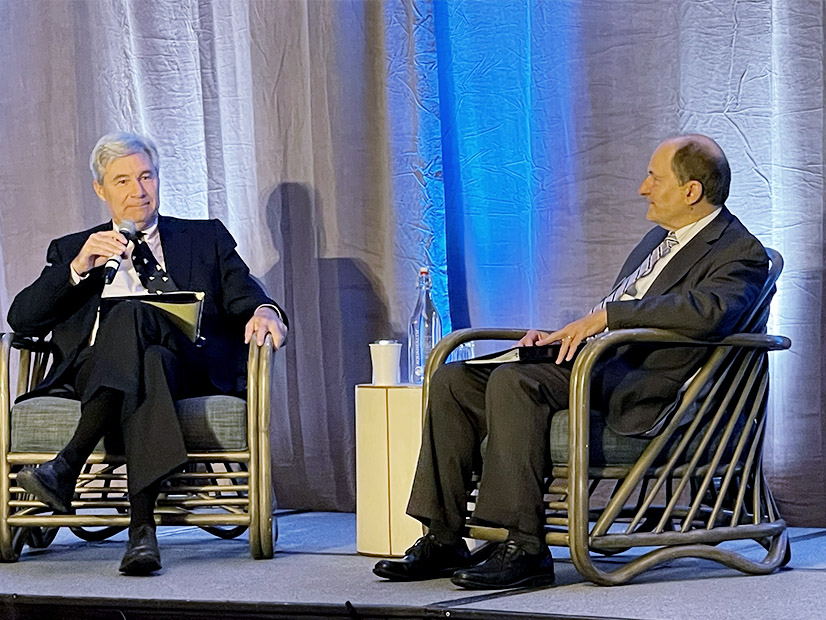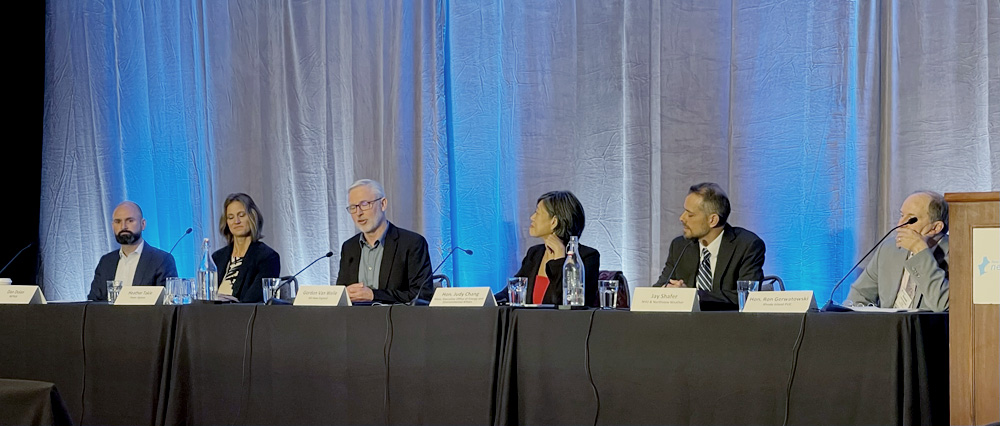
NEWPORT, R.I. — Two years in the making because of a postponement amid the COVID-19 pandemic, the 73rd New England Conference of Public Utilities Commissioners Symposium took place at Gurney’s Newport Resort and Marina in Rhode Island last week.
Here is some of what we heard during the multi-day event.
Extreme Weather, Energy Supply Chain Challenges
Issues in the global energy supply chain have ISO-NE CEO Gordon van Welie worried about the looming winter weather in the region.
“What’s of particular concern this year is the sharp contraction in the global supply chain for [liquified natural gas] — and we know that as a region — we critically depend on imported LNG to offset the constraints that occur on the gas pipelines when things get really cold,” van Welie said during the opening panel on Thursday.
While van Welie was looking ahead to this winter, he mentioned February’s storm and historically low temperatures that plunged Texas into an energy crisis. A polar vortex at the end of December 2017 into early January 2018 was also on van Welie’s mind because there is a similar long-range forecast for the upcoming winter in New England.
“So, with that, and the events that played out in Texas earlier this year, we’re worried about what the implications of that might be,” van Welie said. “In the longer run, we have to get our arms around understanding what these risks are.”
A reliable power system depends on two “critical inputs,” added van Welie: A robust transmission system and energy supply chain. When he looks at the transmission system in New England, van Welie sees “a healthy patient.” However, the energy supply chain, particularly fuel, is a “much more difficult picture.”
“It’s fragile,” van Welie said. “It’s shared by many industries. We know that it gets jammed up in the wintertime, significant frictions and lags, and this is a system that we’re going to depend on for quite a while.”
What happened in Texas provided a “vivid illustration” of “tail risks” — the chances of a loss caused by a rare event, van Welie said. Unfortunately, there is no quick remedy to all of this, he added. Instead, reliability standards and regulatory authority must evolve along with market design.
“We will be proposing expanded ancillary services that will give the operators more tools to manage this variability and uncertainty, but I want to be clear about this, these ancillary services are not going to cover the tail risks, so that’s the conversation we need to have,” van Welie said.
The development of a sustainable marketplace that can create sufficient revenue to provide resource adequacy and reliability is vital, according to Dan Dolan, president of the New England Power Generators Association. To create a sustainable investment market, Dolan said there needs to be better integration of New England states’ decarbonization and clean energy policies. Dolan said he had been a “broken record” about the need for “a multisector, meaningful price on carbon emissions.
 From left: Dan Dolan, NEPGA; Heather Takle, Power Option; Gordon van Welie, ISO-NE; Judy Chang, Massachusetts Executive Office of Energy and Environmental Affairs; Jason Shafer, Northern Vermont University; and Ron Gerwatowski, Rhode Island Public Utilities Commission. | © RTO Insider LLC
From left: Dan Dolan, NEPGA; Heather Takle, Power Option; Gordon van Welie, ISO-NE; Judy Chang, Massachusetts Executive Office of Energy and Environmental Affairs; Jason Shafer, Northern Vermont University; and Ron Gerwatowski, Rhode Island Public Utilities Commission. | © RTO Insider LLC“But there are other ways to do it too, and at a certain point, we just need to go and do it,” Dolan said. “Whether that’s carbon pricing, whether that’s a forward clean energy market, or something else, but unless we are able to integrate those policies into the market, we’re going to be stuck in the bifurcated market of essentially a cost-based program for a certain number of resources and merchant exposure on the other.”
Judy Chang, undersecretary of Energy and Climate Solutions in the Massachusetts Executive Office of Energy and Environmental Affairs, said she is not “totally convinced” that there are not enough market signals for the investments.
“There are lots of enhancements that we need, but I’m not convinced that that the generators don’t have enough incentives to make sure that they’re ready when the prices are $900 [per kWh] or $9,000 [per kWh],” Chang said.
She added ISO-NE can consider market improvements to enhance reliability. There is also a need to understand the contribution of each resource to adequacy, she said.
Carbon Pricing Moment
U.S. Sen. Sheldon Whitehouse (D-R.I.) held a fireside chat on Friday where he discussed the revised Build Back Better Act that includes $555 billion in clean energy funding, which he said is “intended to change the direction and trajectory of the energy industry.” (See Biden, Democrats Unveil $1.75T Build Back Better Framework.)
The spending package has been reduced to win the support of Sen. Joe Manchin (D-W.Va.), whose vote is critical in the closely divided upper chamber. Democrats hold 50 seats, making Vice President Kamala Harris the potential tiebreaker.
“We hope that we can create an environment for Sen. Manchin in which he feels comfortable agreeing to something in the way of a carbon price,” Whitehouse said.
Former FERC Chair and Commissioner and current ISO-NE Board of Directors Chair Cheryl LaFleur told Whitehouse that the reconciliation bill seems tailor-made for a pollution tax. But she asked if politics is the art of the possible, what kind of carbon pricing regime can Democrats get?
“It’s a moment here,” LaFleur said.
Whitehouse said 49 senators would vote yes on a carbon price, and there is one undecided in Manchin. Whitehouse said he has assembled an informal carbon price caucus of 22 senators, which according to Whitehouse, makes it “not just a Sheldon project, this is a very serious thing.”
“We’ve developed a bill with the [Biden] administration that they will not oppose, that they will accept if we can get the votes,” Whitehouse said.
House Speaker Nancy Pelosi (D-Calif.) said that if a carbon price can pass the Senate, “she will get the votes in the House,” Whitehouse said.
Glick Talks ‘Hot Topic’ Tx
FERC Chair Richard Glick opened the conference with a keynote speech Thursday that wasted little time hitting the “hot topic” of transmission. Glick said there is “enormous discussion” about the need for substantial amounts of additional transmission capacity to access remotely located zero-emissions resources like offshore wind.
“But even in addition to accessing zero-emissions generation, we also need to build up the transmission grid in large part to address reliability and resilience needs,” Glick said.
In July, FERC issued an Advance Notice of Proposed Rulemaking to reconsider its rules on transmission planning, cost allocation and generator interconnection. Glick said FERC received 5,000 pages of comments on the ANOPR. He said that the goal is to issue a notice of proposed rulemaking early next year and the final rule, “hopefully,” by yearend. (See FERC Tx Inquiry: Consensus on Need for Change, Discord over Solutions.)
Next Year’s Symposium Set
Incoming NECPUC President Matthew Nelson, chair of the Massachusetts Department of Public Utilities, announced that the next NECPUC Symposium is scheduled for May 22-25, 2022, in Brewster, Mass. Vermont, which was supposed to host the event in 2020 before it was postponed, is slated for 2023.


